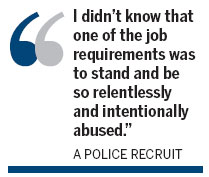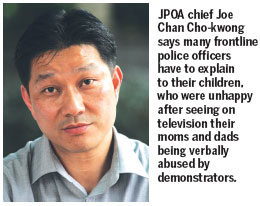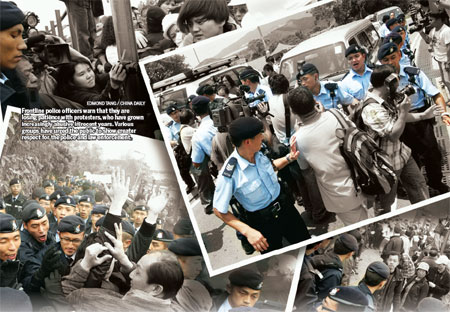Walking the grim blue line
Updated: 2013-09-06 06:44
By Andrea Deng(HK Edition)
|
|||||||||
In a climate of increasing incivility in our society, among the people getting the worst of it are those who are charged with serving as pillars of society. But the disrespect they receive while doing their duty is taking its toll. Andrea Deng reports.
Young people who are intrigued by the heroic image molded in movies or TV series to become a cop in Hong Kong must now realize that one of their job requirements is to be sworn at.
Nowadays the police have increasingly become targets of political activists, who have grown more and more hostile since the early days of radical opposition militancy. Some police officers have to control the outrage that wells up as they carry out their assigned duties of protecting the public, while taunts and missiles are hurled at them.
"Our colleagues are unhappy at work and after work, and that they are reluctant to do the jobs (that involve public order events)," said Joe Chan Cho-kwong, president of the Junior Police Officers' Association.

They are the targets of profanity, curses against their family, insulting references to their sexuality, being called turtles - a common derogatory term referring to cops - and sometimes it can be "unimaginably insulting", said Sam, a seasoned police commander who dealt with public order events more than two decades ago. The officer talked to China Daily on condition of anonymity.
"Please don't mind my quoting these but once a protester was shouting at my sergeant, 'Why are you still here? Where is your wife? Out with another man? Fooling around?'" Sam mimicked the man's coarse voice, quoting a few more curses.
Verbal abuse
Sam recalls one protester during a demonstration on March 6, 2011, who upon seeing Sam, lay down in the road a few meters away, and began shrieking, "the police hit me!"
Kin, a sergeant with 19 years on the force and had lots of experience in crowd control, said officers on crowd control need to be reminded constantly to stay calm.
"We tell our frontline officers not to speak, or respond to any protester who says anything defiant or rude. Sometimes protesters say, 'Why are you here? This is none of your business. Why don't you go and arrest some bad guys?' Our officers don't respond. Sometimes protestors will be holding a video camera, shouting, 'Hey, I am asking you a question. Are you mute? I didn't know that a mute can become a cop. Are you deaf? I am talking to you!'" said Kin.
"After a long day when they're back at the station house, taking off their uniforms, they would complain about the insult they had received at work. 'Today was just ridiculous,' one will say. Another chimes in, '(Someone called me) turtle bastard.'" said Kin.
"Most of them do fine. A few vent their anger on Facebook. One wrote, 'I don't understand why I have to bring my mom to work everyday, (meaning the protestors even cursed his mother) The verbal abuse is just non-stop.' Some keeps quiet at work. So I need to call them up and talk," said Kin.
"The young cops who just joined the force were saying, 'I didn't know that one of the job requirements was to stand and be so relentlessly and intentionally abused. Why should I tolerate it and it's not just dirty words?'" Sam said, adding that some younger cops have quit the force because of it.
Joe Chan said that having to face constant verbal abuse has contributed to the low morale.
"Our biggest concern is that disrespect for police will continue to spread. That would seriously affect the process of upholding the law. Bad citizens could wreck public order. If more and more people are getting the idea that defying the police is fun and all right, that would make our jobs more difficult and affect our work, and really what the job requires is utmost professionalism," Chan said.

A station sergeant was caught on camera about a month ago when about a dozen young protesters stood taunting him with foul language, calling him a "s-t eating dog". Angrily, the officer shouted back, "same for you guys."
Maybe part of the problem is that not one police officer has gone for stress counselling, though it's available to police. That suggests frontline officers are keeping their stress bottled up somewhere. Clearly, part of the reason is that most officers see it as part of the job. They're expected to take it, Chan said.
Affecting families
The problem goes right to families. Their children see mom or dad being verbally abused on TV and can't understand why. These officers find it necessary to try to explain it to them.
"There are quite a number of police whose children are unhappy. So, these officers have to explain to their kids about the responsibilities of the police and the political atmosphere and try to focus on positive values. The pressure on families is definitely increased," Chan said, adding that he also had to explain many times to his two boys until they could understand.
The only internal guideline provided by the senior management in the police force for frontline officers is to maintain high tolerance and high EQ (Emotional Quotient), control themselves and not lose their professionalism, Sam and Chan pointed out.
Internal seminars are held usually after large-scale political demonstrations.
Once Chief Secretary for Administration Carrie Lam Cheng Yuet-ngor stopped in to visit frontline officers. "She was here to show support for the frontline cops, cheering them on and telling them to hang in there," Sam said.
One of the reasons why protesters have been refusing to comply with the demonstration requirements agreed on beforehand between the organizers and the police is their denial or disagreement of the spirit of the Public Order Ordinance, which provided a series of legal restrictions on public order events, assemblies and meetings. Active social movement members said the ordinance has gone against freedom of assembly and freedom of speech.
Kevin Paul Zervos, the outgoing director of public prosecutions, however, made a comment last week that local laws on public assemblies are not unjust as they ensure the protection of safety and welfare of the community. He said it is unlike "civil disobedience" mentioned by great leaders like Martin Luther King Jr and Mahatma Gandhi, which refers to disobedience against unjust law such as segregating the blacks from the whites.
"Our actions have never involved political consideration. Management has never mentioned anything like that. In fact, we have been constantly reminded to uphold the protesters' rights of assembly and freedom of speech," Sam stressed.
"Most protesters - more than 90 percent of them - are peaceful and abide by the law. The troublemakers are always one small group of hardcore regulars," said Sam.
"We are entirely capable of keeping things under control and there is no situation really that's intractable. But what has always discouraged me is that some of the organizers lie - they condemn us in public, saying we imposed unreasonable restrictions. The fact is, we have been imposing restrictions that the protest organizers requested. What also discourages the police is being called Nazis or members of the Japanese army," said Sam.
Chan said the police hope that there can be more respect and less irascibility during lawful political protests.
Ricky Chu Man-kin, secretary-general of the Independent Police Complaints Council, noted that the trust of the general public towards the police has decreased in recent years, and that the police force must pay attention.
"There is a lot of discontent toward the government. But the discontent have been mounted against the police. Hong Kong is not alone. Protests can be even more violent in other countries. There should be clearer guidelines provided to the front line police," said Chu.
There were 30 complaints against the police over handling of public order events in both 2011 and 2012, according to the Police Public Relations Branch. Chu said that there are thousands of complaints every year, so the proportion of complaints arising from public order events is not high.
There are some aspects that frontline police can do much better. They should be more sensitive to the protesters' rights and the reporters' rights. Frontline police should also be more trained up to know how to respond to and deal with on site incidents, Chu said.
But the police force got some consolation when Zhang Dejiang, chairman of the National People's Congress Standing Committee, praised Hong Kong's disciplined forces for their "high level of professionalism and fine style of work" in maintaining public order in the SAR when he met with the forces' delegation on September 3 in Beijing.
Contact the writer at andrea@chinadailyhk.com
|
Frontline police officers warn that they are losing patience with protesters, who have grown increasingly abusive in recent years. Various groups have urged the public to show greater respect for the police and law enforcement. Edmond Tang / China Daily |
(HK Edition 09/06/2013 page1)
